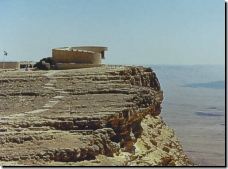
Mitzpe Ramon visitors center sits at
edge of the canyon. | Journey to Israel
Proves Safe for All Ghost Town To Oasis
 ITZPE RAMON, deep in the Negev, was a ghost town in recent years. It wasn’t supposed to be, of course. It was founded by Moroccans in 1956, on the main road to Eilat, and once nurtured ambitions as a manufacturing base. ITZPE RAMON, deep in the Negev, was a ghost town in recent years. It wasn’t supposed to be, of course. It was founded by Moroccans in 1956, on the main road to Eilat, and once nurtured ambitions as a manufacturing base. The location is awesome. The city sits on the Negev mountain, at the edge of the magnificent Ramon Machtesh (canyon). The name derives from the Arabic Ruman, meaning Romans. The government tried to encourage a textile industry. They built an industrial district with a string of structures that could become factories. But nobody came. They couldn’t entice businessmen to this part of the desert, south of Beersheba. The buildings were vacant; the streets barren. In the 1980s the city, with 1,500 people, became stagnant. “Then the Russians came,” says Mayor Dror Dvash, “and the economy and culture picked up. Our symphony orchestra is majority Russian. We’ve been blessed by them.” Mitzpe Ramon, reinvigorated with a population of 5,700, of which 35 percent are Russians and 10 percent Moroccans, has reinvented itself as a tourist destination. It’s become a trendy metropolitan oasis with artists, artisans and other cultural types who transformed the empty hangars into cool lofts for living and working. At Artists House you can view the works of the local painters, calligraphers, photographers, pottery makers, and sculptors. (Phone 08-6586293) Adama is a studio that promotes dance as a healing process and attracts people to its physical therapy programs. The huge building contains a large dance floor, separate carpeted area for discussion, kitchen, and a dozen indoor tents for overnight guests. “We are planning a spa center,” says Yaacov Shavit, director of the city’s development department. “Also a planetarium and an airport. We already have the largest star observatory in the Middle East. “We are getting ready for desert tourism, a new thing.” The Ramon Crater, the largest of three Negev craters, has well preserved fossils from the Triassic and Jurassic eras. This area was the home 200 million years ago of long-extinct marine reptiles. One of the city’s empty housing blocks has been transformed into the attractive Ramon Inn where I stayed in urban comfort. The hotel, part of the Isrotel chain, tries so hard to please that it promises: “If you do not eat a certain dish because it is distasteful to you, we will replace it with an alternative dish or refund the price of the meal.” Where else do you find such concern for the visitor? (Phone: 972-7-6588151) Other local attractions:  | Nature Reserve Authority’s Visitors Center with exhibits of the area.
|  | Bio Ramon, a desert garden where you can see the small mammals and reptiles native to this area – and feed the snakes.
|  | Youth hostel.
|  | Jeep safaris.
|  | Field school for hikers, operated by the Society for the Protection of Nature.
|  | The only alpaca farm in the Mideast, where you may feed the animals. | There are even two yeshivas, one billing itself as “an ecological-democratic yeshiva.” 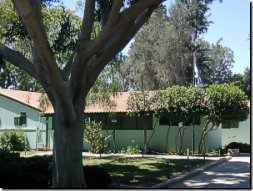
Ben-Gurion’s retirement home in
Kibbutz Sdeh Boker in the Negev. | In Paula’s Memory
 T Kibbutz Sdeh Boker, I visited David Ben-Gurion’s retirement home. He lived here until his death in 1973. There is an early television set, but am told that Israel’s first prime minister never watched. Instead, he would choose from his collection of 5,000 books in nine languages. T Kibbutz Sdeh Boker, I visited David Ben-Gurion’s retirement home. He lived here until his death in 1973. There is an early television set, but am told that Israel’s first prime minister never watched. Instead, he would choose from his collection of 5,000 books in nine languages. His wife Paula would busy herself in the kitchen, cooking what she called “cuchmuch.” The concoction consisted of cheese, yogurt, apple and strawberry juice. Ben-Gurion hated it. Once, after his wife’s death, the old man made the same mush. His daughter was surprised. “You never liked it!” “In her memory, I eat it.” Pit Stop on Spice Road
 NE other stop worth making, while sojourning in the desert, is Avdat National Park. On the mountain top are the remains of a Nabatean city of the 4th century BCE. These lords of the desert were a fierce idol-worshiping tribe, which controlled this 63rd way station on the fabled Spice Road. NE other stop worth making, while sojourning in the desert, is Avdat National Park. On the mountain top are the remains of a Nabatean city of the 4th century BCE. These lords of the desert were a fierce idol-worshiping tribe, which controlled this 63rd way station on the fabled Spice Road. Camel caravans passed through here, laden with exotic herbs, perfumes and treasures from the Orient bound from Petra to points west, which meant the Roman Empire. 
David Karni with wife Limor, son
Dvir, and daughter Sheked on
vacation in Avdat. | What’s left of the fortress is an imposing sight. You can see the wine press, pottery workshop, bathhouse, caves, dwellings and burial grounds. Standing on the high plateau, you’ll understand how the Nabateans commanded a vast view of the terrain, which is still heart stirring. I met other tourists here, mainly from Israel. David Karni, 31, a computer engineer from Petach Tikvah, was enjoying his vacation with his wife Limor, 30, and son Dvir, 4, and daughter Sheked, 3. 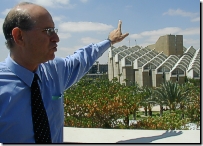
Ben-Gurion University president
Avishay Braverman shows us
the impressive campus library. | Israel’s Political Dilemma
 HERE are 16,200 students at Ben-Gurion University in Beersheba. Avishay Braverman, at 57 the youngest university president in the country, is apprehensive about their future. Will they stay in the country and contribute, or will they leave for greener pastures? HERE are 16,200 students at Ben-Gurion University in Beersheba. Avishay Braverman, at 57 the youngest university president in the country, is apprehensive about their future. Will they stay in the country and contribute, or will they leave for greener pastures? “They deserve better governance,” Braverman said. “Can you imagine such a small country with 40 ministers and vice ministers? We have to learn how to govern and become a mature country. “Otherwise these young people will go elsewhere. That’s the dilemma of Israel today.” He warns that Israel needs a wakeup call, a revolution, “to change the way the political game is played.” What changes does he call for? First, he says, the government should have no more than 12 ministers, not the present three dozen or so. And those ministers need to be leaders of people, not followers of polls. “Today’s leaders get up every morning and look at the polls to see what the people want, what to do. We need leaders capable of making decisions, not follow polls. Lincoln, Truman and Ben-Gurion didn’t follow polls.” Second, he says, the Jewish people should focus on the Negev. “We must create a metropolis here. Otherwise our people will go to Tel Aviv or the United States.” 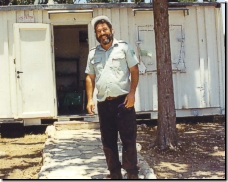
William Richman, JNF forest ranger, at
his new trailer office. The old office was
carted away by one night by persons
unknown. | Vanished In The Night
 IKE many other tourists in Israel, I planted a sapling in the Jewish National Fund’s Ben Shemen Forest at Modi’in. Forest ranger William Richman helped me establish roots in the land. The first trees were planted here in 1908. Since then JNF has planted 220 million trees in the country. Israel is the only country in the world with more trees at the beginning of the 21st century than at the beginning of the 20th. IKE many other tourists in Israel, I planted a sapling in the Jewish National Fund’s Ben Shemen Forest at Modi’in. Forest ranger William Richman helped me establish roots in the land. The first trees were planted here in 1908. Since then JNF has planted 220 million trees in the country. Israel is the only country in the world with more trees at the beginning of the 21st century than at the beginning of the 20th. Richman, a Bronx native who made aliyah in 1978, showed me his new trailer office. His previous office, also a trailer, disappeared one night last year. 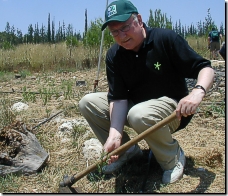
Planting roots in the Holy Land, at a
forest of the Jewish National Fund. | “It was apparently hauled off on a flatbed truck,” he said, “probably by a passing truck driver who took a fancy to it.” Cleaning up a River
 VISIT to the Hefer Valley in central Israel shows you how much the Jewish National Fund has accomplished in reclaiming the environment from swampland. The valley, between Netanya and Hadera, consists of 42 thriving communities. One quarter of the population work in agriculture, growing oranges and grapefruit. VISIT to the Hefer Valley in central Israel shows you how much the Jewish National Fund has accomplished in reclaiming the environment from swampland. The valley, between Netanya and Hadera, consists of 42 thriving communities. One quarter of the population work in agriculture, growing oranges and grapefruit. JNF forest ranger Adi Naali took me on a tour of Nachal Alexander, a river that was named for Alexander Yannai, the Hasmonean king of 102 BCE. The river rises in the area of Nablus (Shechem), Mount Gerizim and Mount Ebal, making it way in tributaries to the Hefer Valley and out to the Mediterranean. The river was a source of swamps until JNF cleaned it up. Today it is home to the soft-shelled turtle. 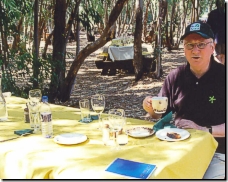
Picnic at Alexander River.
Photo by Shay Kramer | “The Alexander River picks up sewage at Tulkarm and Nablus and flows down here,” Naali said. “We collect the sewage that flows down from the Palestinian side.” We crossed the only suspension bridge in the country to gaze at the waters, pedestrian paths, recreation areas and various flora on the banks. We enjoyed a picnic by the Alexander, with wine from the Binyamina Winery in the region. The winery is owned by Avi Lerner and Danny Dimbrut, who run New Image Film Productions in Los Angeles. Care of Concrete Creek
 HAI ZAKAI is a sculptor whose life’s goal is to heal people from their environmental indifference. She is an ecological artist on a mission to raise awareness not to contaminate the neighborhood. HAI ZAKAI is a sculptor whose life’s goal is to heal people from their environmental indifference. She is an ecological artist on a mission to raise awareness not to contaminate the neighborhood. I saw her handiwork in the Valley of Elah, where David slew Goliath. Nearby is Etziona Creek. It’s a creek no longer. Today it’s a dry riverbed. “There’s a quarry and cement factory in the area,” Zakai said. “Their trucks would dump cement into the creek.” 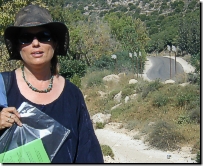
Ecoartist Shai Zakai at
Concrete Creek in Emek Haela. | The artist persuaded the truckers to do their dumping elsewhere. Then, with their help, she erected 100 concrete flags alongside the creek. “Concrete Flags Avenue” took a year to make. Zakai built an exhibit of found objects from the creek, things like ammunition cases and car batteries that had been carelessly thrown into the polluted stream over the years. In an effort to rehabilitate the public, she enlisted the help of the quarry workers – welders, cement-mixer drivers, foreign workers, Bedouins, moshav members, Palestinians as well as the owners – in her artistic creation. “They appreciate my concern,” Zakai told me. “They even helped me make the concrete flags I’ve placed along the creek.” “I believe,” she wrote in a manifesto, “that transforming them into ‘fleeting artists’ makes it possible to put issues they have never addressed before on the agenda, thus inspiring a changed state of mind and, consequently, a higher level of awareness.” Zakai said she’s working on Master’s Degree at Hebrew University in art and environmental policy, “a study that didn’t exist before.” 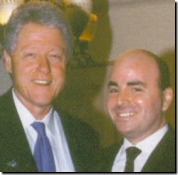
General Manager
Ronen Nissenbaum welcomes
Bill Clinton to the
David Inter-Continental. | Newest Hotel on the Block
 OR my last night in Tel Aviv, there was only one place: David Inter-Continental Hotel. Opened in 1999, it’s truly the city’s most lavish accommodations on the beach waterfront. I found it ideally located, near Jaffa, and within walking distance to the business, shopping and cultural centers. OR my last night in Tel Aviv, there was only one place: David Inter-Continental Hotel. Opened in 1999, it’s truly the city’s most lavish accommodations on the beach waterfront. I found it ideally located, near Jaffa, and within walking distance to the business, shopping and cultural centers. First thing I did was to stroll on Tel Aviv’s famed seafront promenade. Nearby is the Dolphinarium disco, where a suicide bomber blew himself up, taking 21 young lives with him, all victims from the Russian community. The David Inter-Continental is ideal for the business traveler. There are rooms for meetings and seminars, with all the technical equipment. It boasts the largest hotel banqueting and convention center that can serve 5,000 guests. 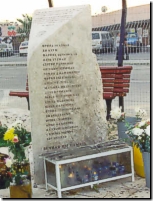
Dolphinarium disco
memorial to the 21 young
Russians killed by a
suicide bomber. | Some of the events here included the launching of the Citibank branch in Israel, WIZO’s 80th convention, and Siemens Germany Incentive. Such VIPs as Bill Clinton, Chinese President Jiang Zemin and French Defense Minister Alain Richard, and such celebrities as Antonio Banderas, Melanie Griffith and Susanne Vega have all stayed here. For more information visit www.tel-aviv.interconti.com. |